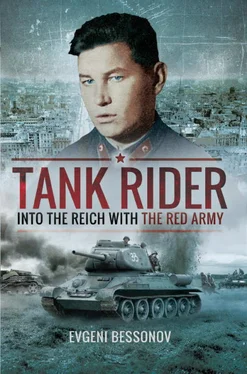The events that followed were even more horrible than I could imagine. I had not seen such a thing before at the front. A German APC arrived and at first we did not pay attention to it, as they normally had a machine-gun mounted on them. But all of a sudden the APC started to shoot fireballs and flame and I realized that this was a flame-thrower – a horrible weapon that burnt people to ashes and could even burn a tank. The temperature of the flame was very high, if I am not mistaken, it was around 1,000 degrees Celsius. The APC threw flame several times. It was good that it was at first behind a house and the company’s soldiers were out of its sight. When the APC emerged from behind the house, we were extremely lucky. Before it could throw flame at the soldiers who had not yet made to follow Chernyshov’s command and at my platoon, two shots sounded from the other side of the channel, and the APC’s flame liquid container exploded, killing all of its crew. The APC was knocked out by the battalion’s artillery battery. They did a great job by not missing with the first shot, otherwise we would have been in big trouble. The enemy’s tanks fired several rounds against the other side of the channel, turned and departed from our sight. Chernyshov again gave us the ‘Forward!’ order; we all stood up and entered the town. With no enemy armour in sight it was a different story. There was no enemy infantry there. As we were passing by the spot at which the flame-thrower fired, we saw the burnt bodies of our soldiers, mere ashes. It was an awful sight, although I had seen a lot of sights in the course of the war. Luckily, there were only three to five burnt soldiers, but they died because of the stupidity of one foolish commander, following an idiotic order. Later the incident was forgotten and no one recalled it. But I still recall that battle and those soldiers burnt by the flame-thrower even 60 years later…
At first I wanted to move forward through the gardens, not in the streets, just in case, but it did not work. Every garden with a mansion was separated from the next one by a fence, a high and strong metal mesh. We had to move forward along the street, and we did not even check the houses, which were locked – so much was Chernyshov hurrying us. It was late, but it was still light. In some places we had to fire on individual targets. Some random Fritzes were still there sometimes. I have already written that the town of Ketzin was part of our combat mission, and we were supposed to meet the troops of the first Belorussian front in the town. The town was captured by practically a single company without tanks, because they were only just starting to cross the channel on the ferries that were brought up. Late in the evening of 24 April, 1945, my platoon and company established contact with cavalry reconnaissance and the tanks of the first Belorussian front. Thus, Berlin was fully encircled by Soviet troops. That was the day when I was wounded.

THE END OF THE WAR

We were standing in a group by a house, such things happened in built-up areas, although one should never do that. Company commander Chernyshov and telephone or radio operators for communication with battalion commander were also there. I sent the company’s men forward – we should not have stood in such a big group. I was rescued by the fact that I had walked several steps from the house in order to follow the company’s men and had not hung around Chernyshov. In that very moment a random shell hit the house’s wall – whether German or Russian, its explosion cut many men down. I was wounded by its splinters along with several other men from signals platoon; several men were killed. Again, I believe that I was lucky, which happened time and again in that war. My belt buckle saved my life. The splinter went through it and got stuck in it, severely tearing the skin on my stomach. The blow was so strong that it bent me double. The other splinter hit my leg; the third one seriously damaged three fingers on my left hand, almost tearing them off. Some other smaller splinters hit me was well.
They bandaged me on the spot, and the battalion’s doctor Pankova sent me in a truck to a hospital along with the other wounded. First they sent me to a transit hospital in Luckenwalde, which was in the building of a former German hospital. I should say that we were lucky in our journey to the hospital, too: Germans, who were wandering in forests, abandoning Berlin in small groups, could have caught us. The Germans would merely execute the wounded; they were angry enough to do that. There was a rumour in Luckenwalde that some trucks with wounded were under fire or were even destroyed, but our vehicle made it safely either before Germans appeared on the highway or after they had left the highway and disappeared into the forest. There were many wounded in Luckenwalde and we all sat in an underground corridor, from which we were transported to the other hospitals by trucks. I sat on the floor with my back against the wall, sometimes sleeping or dozing off, as it was already almost morning. The medical inspection was under way; depending on the wound we were distributed among different hospitals and that set the order of evacuation. Several doctors walked up to me as well. A female doctor, a Major of the Medical Corps, asked me about my wound and how long I had been at the front. I answered her and she gave an instruction to another doctor to evacuate me immediately with the first truck available.
During the night of 26 April I was sent to the stationary hospital of the 4th Guards Tank Army in Sarau, also in Germany, but deep in our rear. We arrived there around noon. I met several soldiers from my company and my platoon; some of then had been in the hospital from the very first day of the offensive, 16 April, while others had arrived earlier. I gave my pistol and map case to one of the soldiers. I unclipped my decorations from my tunic and wrapped them in a handkerchief together with my party membership card and other papers. First the girls washed the others and me in a steam bath – it was hard to wash myself with one hand. They took my uniforms (tunic, trousers, field cap and probably greatcoat) for fumigation to kill all the insects and threw away all my underwear and foot wrappings, giving me new underwear after the steam bath.
They put me on a table in a dressing room. A surgeon, Major of Medical Corps, started to inspect me and gave nurses instructions about the bandages. One of the nurses asked my permission to have a look at my decorations in the handkerchief, and told the Major: ‘Look how many decorations he has.’ The Major asked me how long I had been at the front, and I answered that I started in 1943, was lightly wounded but never went further than the Brigade’s medical platoon. ‘Yeah, ‘ he said, ‘For the first time in this war I see a Lieutenant, a platoon leader and a company commander, also a tank rider, who was seriously wounded for the first time after two years at the front.’ They bandaged me and the Major said that I should again come and see him at lunch, and then they took me to my room. I put on my old uniform that had already been ‘fried’. They put me in a hospital room that had three beds. The hospital was located in a three- or four-storey building. I think that it had been an apartment house before, but the German inhabitants had abandoned it with the approach of the Soviet troops. The beds had linen, a pillow and a blanket. As Lieutenant Guschenkov would tell me, it would be good if I was lightly wounded, go into a hospital to sleep on a clean bed with clean sheets! This was exactly the place that he wished for me.
Читать дальше














